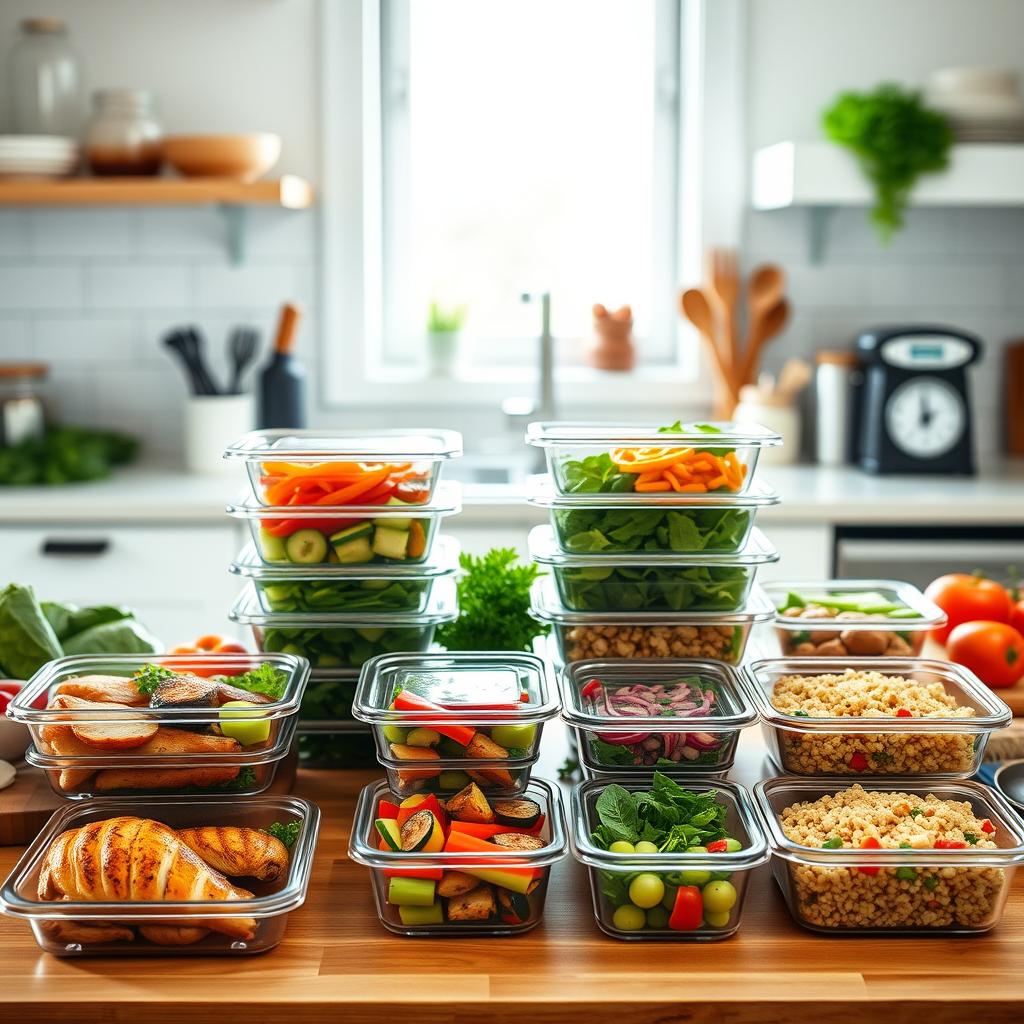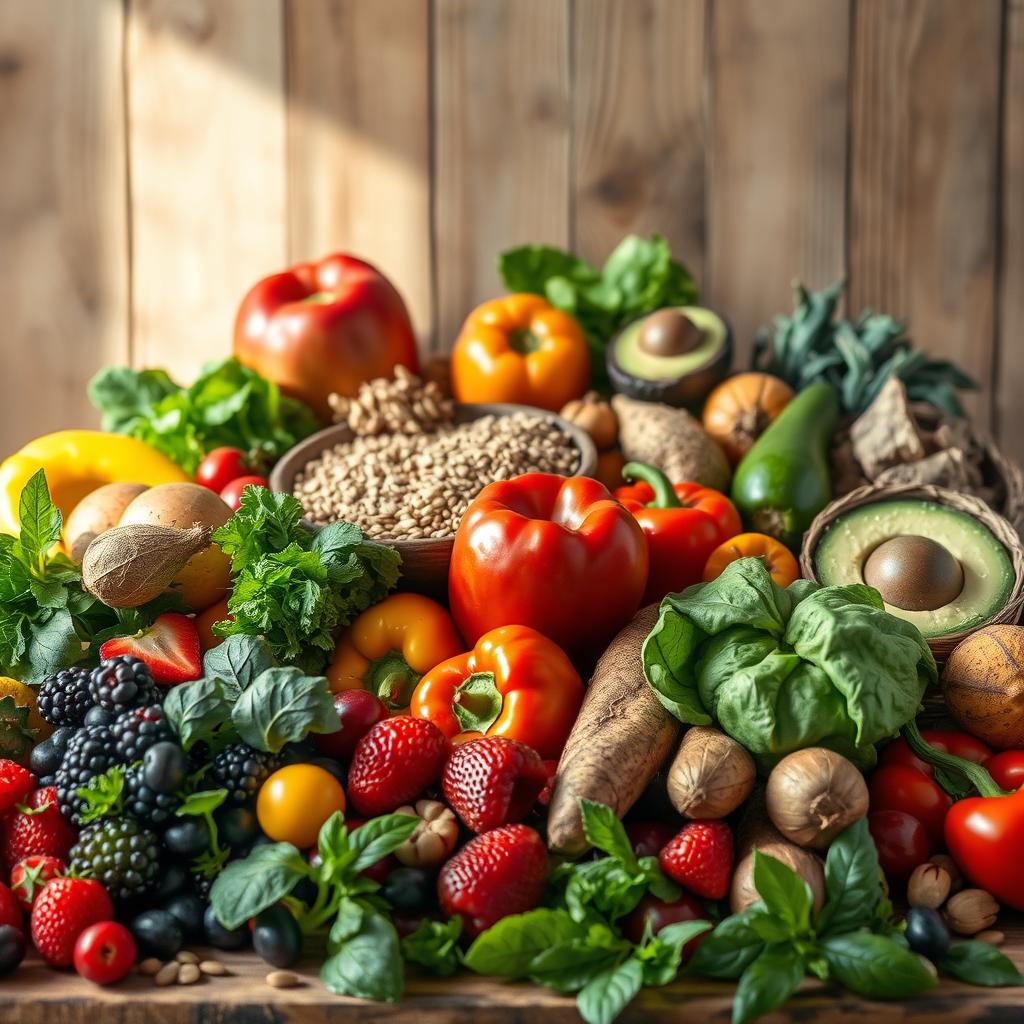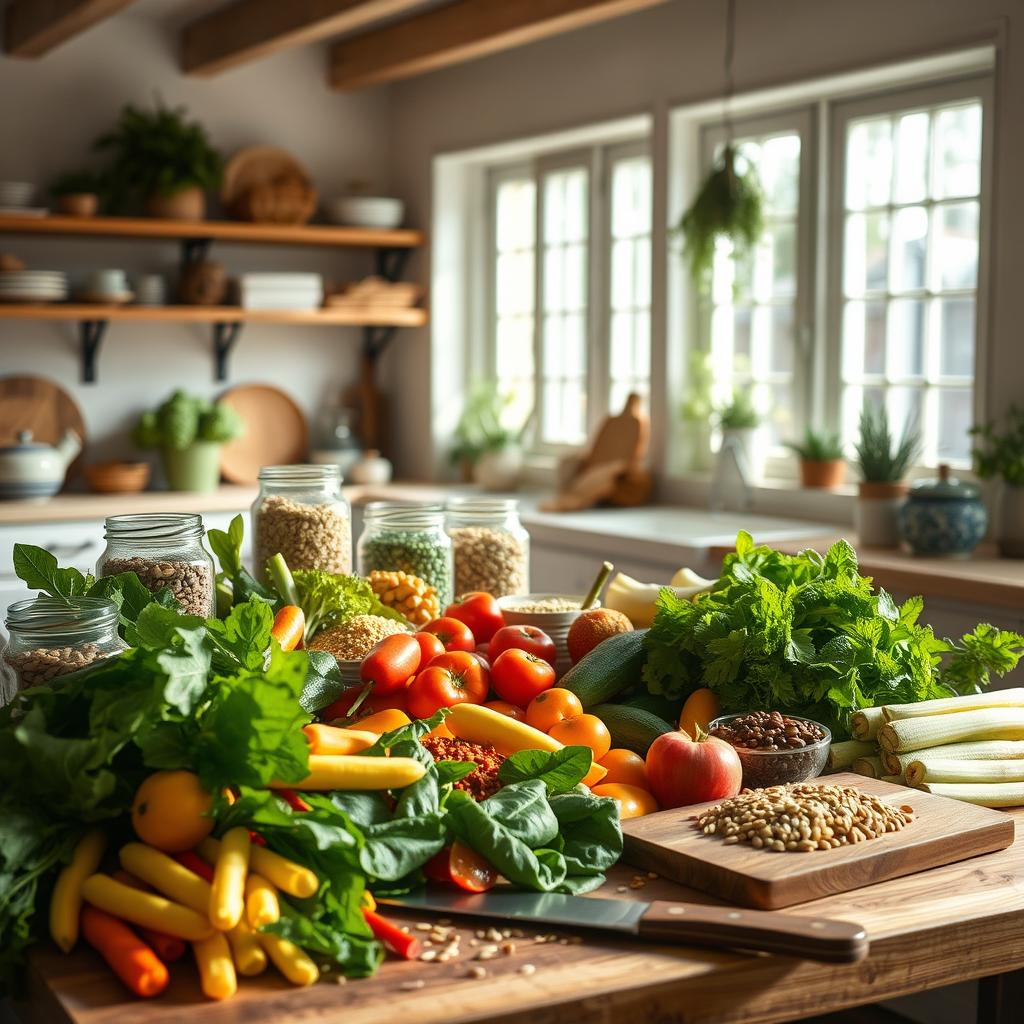Are you tired of sacrificing your health for the sake of convenience? We know that busy schedules often lead to unhealthy eating habits, with quick takeout meals becoming the norm. However, this doesn’t have to be the case!
Meal prepping can be a game-changer. By dedicating a few hours each week to preparing your meals, you can save time during the week and ensure you’re eating nutritious food. It’s not just about cooking in bulk; it’s about creating a routine that works for you and your lifestyle.
Whether you’re a seasoned cook or a kitchen novice, meal prep can be tailored to your needs and preferences. By adopting this practice, you’ll not only save time but also develop healthier eating habits that can transform your overall well-being.
Key Takeaways
- Discover how meal prepping can revolutionize your weekly routine.
- Learn the basics of meal prep that can be customized to your dietary needs.
- Understand how dedicating a few hours to meal prep can save you time during the week.
- Find out how meal prepping can help you transition to healthier eating habits.
- Get tips on how to make meal prep work for you, regardless of your cooking experience.
Why Meal Prepping Is Worth Your Time
Meal prepping is a simple yet effective strategy for saving time, reducing stress, and eating healthier. By planning and preparing your meals in advance, you can take control of your nutrition and make healthier choices.
Health Benefits of Planning Your Meals
Planning your meals in advance directly contributes to better nutrition. By controlling portions, ingredients, and balance across your meals, you can achieve a more nutritionally balanced diet. As we explore in our discussion on meal prepping, having a plan eliminates the stress of last-minute meal decisions, improving your relationship with food. “Planning meals ahead of time can lead to healthier eating habits and a more balanced lifestyle,” as it allows for careful consideration of nutritional needs.
Financial Advantages of Meal Prepping
Meal prepping also offers significant financial benefits. By planning your meals and making a grocery list, you can avoid last-minute takeout or restaurant meals, which tend to be more expensive. Additionally, meal prepping reduces food waste, which is both environmentally friendly and budget-conscious. According to a study, planning meals and making a grocery list can help save money on food expenses. We can save money and reduce waste by adopting this simple yet effective strategy.
By prepping meals in advance, we can enjoy healthier eating while also keeping our budgets in check. This approach not only streamlines our weekly routines but also promotes a more sustainable lifestyle.
Getting Started: Essential Meal Prep Supplies

Meal prep can be a game-changer, but it all starts with having the right supplies and tools in your kitchen! To make meal prepping efficient and enjoyable, you’ll need to invest in a few essential items.
Storage Containers and Organization Tools
Investing in quality storage containers is a must. Consider their intended use – if you’ll be freezing, microwaving, or cleaning them in a dishwasher, ensure they are safe for these tasks. Organization tools, such as labels and dividers, can also help keep your ingredients tidy and easily accessible.
Time-Saving Kitchen Equipment
Having the right kitchen equipment can make a big difference. Pressure cookers and slow cookers are great for preparing meals quickly, while a food processor can be a huge help in prepping vegetables for salads, soups, and more.
Meal Planning Templates and Resources
To stay organized, consider using digital or printable meal planning templates. These can simplify your weekly planning process and help you keep track of your meals. By having the right tools and supplies, you’ll be well on your way to successful meal prepping!
Step-by-Step Guide to Meal Prep Like a Pro
The key to successful meal prep lies in careful planning, efficient shopping, and a well-organized kitchen. To meal prep like a pro, you need to master these three fundamental steps.
Planning Your Weekly Menu
Before you start chopping any ingredients, take a few minutes to map out your meals for the week. Think about breakfasts, lunches, dinners, and snacks. Pick meals that are easy to prepare in bulk and use overlapping ingredients to reduce waste and save time. We recommend creating a realistic weekly menu that balances variety with efficiency, ensuring you don’t get bored with your meals.
| Meal Type | Example Meals | Key Ingredients |
|---|---|---|
| Breakfast | Overnight oats, scrambled eggs | Oats, eggs, vegetables |
| Lunch | Salads, wraps, quinoa bowls | Greens, proteins, quinoa |
| Dinner | Grilled chicken, roasted vegetables | Chicken, mixed vegetables |
Creating an Efficient Shopping List
Once you have your menu planned, create a detailed shopping list organized by store sections (fresh fruit and vegetables, proteins, pantry items, etc.). This will help you shop optimally and avoid multiple trips to the store. We suggest analyzing your schedule before planning to determine which days need quick-assembly meals and which allow for more cooking time.
Setting Up Your Kitchen for Success
To maximize productivity and minimize cleanup time, it’s essential to set up your kitchen before you begin prepping. Ensure your workspace is clear, your tools are within reach, and you have sufficient storage containers. By doing so, you’ll be able to focus on prepping ingredients in ways that maximize their versatility across different meals throughout the week.
Time-Saving Meal Prep Techniques
By implementing a few simple meal prep techniques, we can enjoy healthy meals without spending too much time in the kitchen. Meal prepping is all about efficiency, and with the right strategies, we can save time while still enjoying a variety of delicious meals.
Batch Cooking Fundamentals
Batch cooking is a cornerstone of efficient meal prep. By preparing larger portions or doubling recipes, we can freeze leftovers for future meals, significantly reducing cooking time during the week. This technique is particularly useful for staples like grains, soups, and stews.
Multi-Tasking in the Kitchen
Multi-tasking is another key strategy for save time during meal prep. While foods are baking or simmering on the stovetop, we can chop vegetables and fresh fruit, or wash and dry salad greens for later use. This approach maximizes our kitchen productivity.
Prep Once, Eat Twice Strategy
The “prep once, eat twice” strategy involves cooking a recipe and then repurposing its components into a new meal later in the week. For example, roasting a large batch of vegetables can provide a base for multiple meals, from salads to wraps. This technique not only save time but also reduces food waste.
Meal Prep Like a Pro: Save Time and Eat Healthier Every Day
Mastering meal prep is a game-changer for busy lives, allowing for healthier eating without the daily cooking hassle. By dedicating a specific day to meal prep, you can enjoy a stress-free week with healthy meals ready to go.
Dedicated Meal Prep Day Routine
Establishing a consistent meal prep day routine is key to making the most out of your efforts. We recommend setting aside an hour or two on the weekend to plan, shop, and prep your meals for the week. Make this day enjoyable by listening to your favorite podcast or playlist!
Quick Assembly Meals for Busy Weeknights
On busy weeknights, having quick assembly meals can be a lifesaver. By prepping components like proteins, vegetables, and grains in advance, you can easily assemble a nutritious meal in no time. Consider preparing a mix of fully-cooked meals and component-based meals to keep things interesting.
Balancing Variety and Efficiency
To avoid meal prep burnout, it’s essential to strike a balance between variety and efficiency. Incorporate different proteins, vegetables, and whole grains into your meal plan to maintain texture and flavor variety. You can also prep meals that can be mixed and matched throughout the week.
| Meal Prep Strategy | Benefits | Tips |
|---|---|---|
| Dedicated Meal Prep Day | Saves time during the week, reduces stress | Make it enjoyable with music or a podcast |
| Quick Assembly Meals | Easy to prepare on busy nights, healthy | Prep components like proteins and vegetables |
| Balancing Variety | Keeps meals interesting, prevents burnout | Incorporate different proteins, veggies, and grains |
By implementing these strategies, you can meal prep like a pro and enjoy healthy, delicious meals throughout the week. Whether you’re a busy professional or a parent on-the-go, meal prep can help you save time and eat healthier every day.
Food Storage and Safety Guidelines
To get the most out of your meal prep, it’s essential to understand the guidelines for storing and handling food safely. Proper storage and handling techniques not only maintain the quality of your prepped meals but also prevent foodborne illnesses.
Proper Refrigeration Timeframes
Refrigerating your prepped meals at 40°F or lower is crucial. Here are some general guidelines for refrigeration timeframes:
– Cooked ground poultry or ground beef should be consumed within 1-2 days.
– Cooked whole meats, fish, and poultry, as well as soups and stews, can last 3-4 days.
– Cooked beans and hummus can be safely stored for up to 5 days.
– Hard-boiled eggs and chopped vegetables stored in airtight containers can last up to 1 week.
| Food Item | Refrigeration Timeframe |
|---|---|
| Cooked ground poultry or ground beef | 1-2 days |
| Cooked whole meats, fish, and poultry; soups and stews | 3-4 days |
| Cooked beans; hummus | 5 days |
| Hard-boiled eggs; chopped vegetables in airtight containers | 1 week |
Freezer-Friendly Meals and Storage Tips
For longer storage, freezing is a great option. When freezing at 0°F or lower, the following timeframes apply:
– Soups and stews, as well as cooked beans, can be stored for 2-3 months.
– Cooked or ground meat and poultry can be safely frozen for 3-6 months.
– Berries and chopped fruit stored in freezer bags can last 6-8 months.
– Vegetables, if blanched first, can be stored for 8-12 months.
Preventing Food Waste and Spoilage
To minimize food waste, it’s essential to label your stored meals with the date they were prepared and to consume the oldest items first. Using airtight containers can also help extend the freshness of your prepped meals. By being mindful of your meal prep storage and sequencing your meals throughout the week, you can significantly reduce waste and keep your meals fresh and safe to eat.
By following these guidelines and tips, you can enjoy your prepped meals while maintaining their quality and safety. Proper storage and handling are key to successful meal prep!
Meal Prep-Friendly Foods and Recipe Ideas
The best meal prep results come from using the right ingredients. When it comes to meal prep, some foods hold up better than others. We will explore the best options for proteins, vegetables, grains, and snacks that can be prepped in advance without compromising on taste or texture.
Proteins That Hold Up Well
Proteins are a crucial part of any meal. For meal prep, it’s essential to choose proteins that maintain their texture and flavor over several days. Chicken, fish, tofu, tempeh, lentils, beans, and eggs are excellent options. These proteins can be cooked in bulk and used in various dishes throughout the week.
Versatile Vegetables and Grains
Vegetables like broccoli, carrots, spinach, bell peppers, roasted cauliflower, and green beans are great for meal prep. They can be pre-chopped, pre-cooked, or stored raw for quick assembly meals. Grains such as brown rice, quinoa, whole wheat pasta, sweet potatoes, and oats form the foundation of many meals and can be cooked in advance.
Make-Ahead Breakfast and Snack Options
Breakfast and snacks are just as important as main meals. Hummus, Greek yoghurt, boiled eggs, energy bars, and rice cakes make great snacks. For breakfast, consider prepping overnight oats or breakfast burritos. These options save time in the morning while providing nutrition and satisfaction.
Conclusion: Making Meal Prep a Sustainable Habit
With the strategies outlined in this article, you’re ready to turn meal prepping into a lasting habit that benefits your health, budget, and time. To make meal prepping a sustainable part of your lifestyle, consistency is key. Schedule a block of time each week for meal planning, and you’ll find it takes as little as 10-15 minutes! As you continue, you’ll learn what meals work best for you and your family. We recommend involving family members in the process to distribute the workload and increase buy-in. By focusing on the benefits to your health, budget, and time, you’ll stay motivated to maintain this healthy habit.
To keep your meal prep routine on track, be flexible and adapt to changes in your schedule, preferences, and household needs. Celebrate your meal prep wins and use them as motivation to continue! By doing so, you’ll make healthy eating a seamless part of your daily routine, saving you time and stress in the long run.


